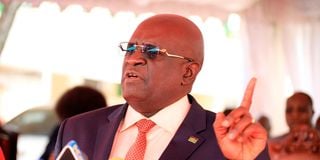Magoha: Hard-driving manager who despised failure, weakness

Former Education CS George Magoha. Prof Magoha threatened, cajoled and pushed us hard but he meant well.
“One of the men behind him cleared his throat. Ikemefuna looked back, and the man growled at him to go on… The way he said it sent cold fear down Ikemefuna’s back. His hands trembled vaguely on the black pot he carried… Ikemefuna felt his legs melting under him. And he was afraid to look back. As the man who had cleared his throat drew up and raised his machete, Okonkwo looked away. He heard the blow. The pot fell and broke in the sand. He heard Ikemefuna cry, ‘My father, they have killed me!’ as he ran towards him… Okonkwo drew his machete and cut him down. He was afraid of being thought weak.”
These devastating words are from Chinua Achebe’s famous novel, Things Fall Apart. The 15-year-old character, Ikemefuna, a boy from the neighbouring clan of Mbaino, had been offered as a substitute for a woman who had been killed in Okonkwo’s village.
Then a decision was made that Ikemefuna had to be killed. Ikemefuna then lived in Okonkwo’s house, so he was like his own child. “That boy calls you father,” Okonkwo had been advised. “Bear no hand in his death.” But Okonkwo still did it because he was “afraid of being thought weak”.
This fear of failure and weakness haunted Okonkwo throughout his life. This motivated him to work diligently, achieving great success as a renowned wrestler, fierce warrior and a successful farmer of yams.
In several aspects, Okonkwo is like the late Prof George Magoha (a renowned urologist) who passed away on January 24, 2023. Okonkwo was “was tall and huge…(with) a very severe look”. This was like Prof Magoha, who was powerful, patrician, bold and towering over six feet tall, and had an intimidating frame accompanied by an even more intimidating “severe look”.
Prof Magoha, like Okonkwo, hated failure and weakness. And like Okonkwo, who was self-driven and hard-working, Prof Magoha drove himself hard. He did not ask others what he didn’t do himself. An unsentimental practitioner of the famed “management by walking around (MBWA)”, he moved indefatigably from school to school after he was appointed Cabinet Secretary for Education.
Hard work
He also expected those who worked under him to work as hard as he did. He was like Okonkwo, who “had no patience with unsuccessful men”.
And it was in dealing with those that worked under him that his ruthless instincts of the executive warrior kicked in—in the melodramatic fashion of a militarised show of force.
A group of us who were doing some work for him were on the receiving end of his ultimatum in one barbed encounter.
We were huddled in a room, and he sat facing us— exuding power and, in my opinion, some terror.
We must have sat with hands clenched respectfully together, our heads bowed low, looking as though we wanted to sink into the floor (we would soon find out that appearing humble wouldn’t help us!)
The work we were to do needed at least three months to complete.
An aggressive contrarian, Prof Magoha spoke unpolished sentences, in the firm, menacing words with ricocheting vowels and consonants like in a strange vernacular—jarring and shocking.
“I want this work done in three weeks,” he snapped in a harsh takedown.
He was in certain ways like a man from an alien place: not the ordinary manager but a harsher kind who believed that a human being could make the impossible possible if pushed hard enough! In our case, he said menacingly, “You have three weeks”.
Pin-drop silence
The room fell into pin-drop silence, even the lights must have looked dimmer and the air dryer in that cloud of perfumes and breaths. His presence seemed to configure and doom every breath of life in that place.
I lifted my hand, explained that three weeks was an impossible deadline and asked for some more time.
“Do you want me to do the work for you?” Prof Magoha fired back.
I recoiled. Three weeks.
Looking back, Prof Magoha must have known how hard the work was, but he probably wanted us to give it our absolute best (it didn’t appear that way at the time).
It’s like when Okonkwo pushed Ikemefuna and his son to work harder: “Inwardly Okonkwo knew that the boys were still too young to understand fully the difficult art of preparing seed yams.
But he thought that one could not begin too early... Okonkwo wanted his son to be a great farmer and a great man. He would stamp out the disquieting signs of laziness that he thought he already saw in him.
‘I will not have a son who cannot hold up his head in the gathering of the clan. I would sooner strangle him with my own hands. And if you stand staring at me like that,’ he swore, ‘Amadiora will break your head for you!’”
Prof Magoha threatened, cajoled and pushed us hard but he meant well. In fact, we later developed a better rapport towards the end of his term.
We picked a vital lesson: excellence requires hard work. That work pushes people out of their comfort zone, forcing them to think creatively, improvise and adapt to deliver in weeks what would have taken months. Go well, Prof. The challenge was great. But we learnt a vital lesson.





